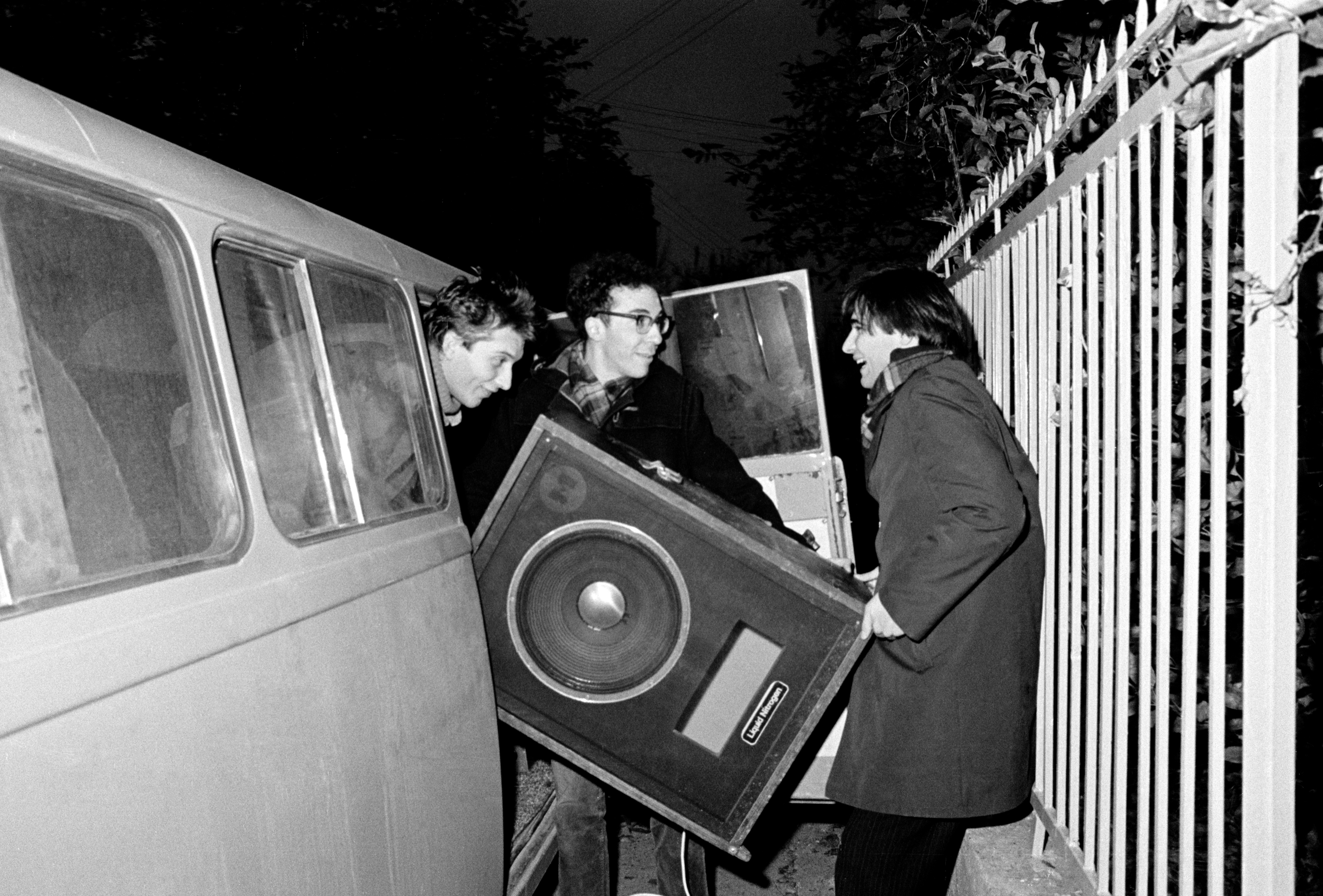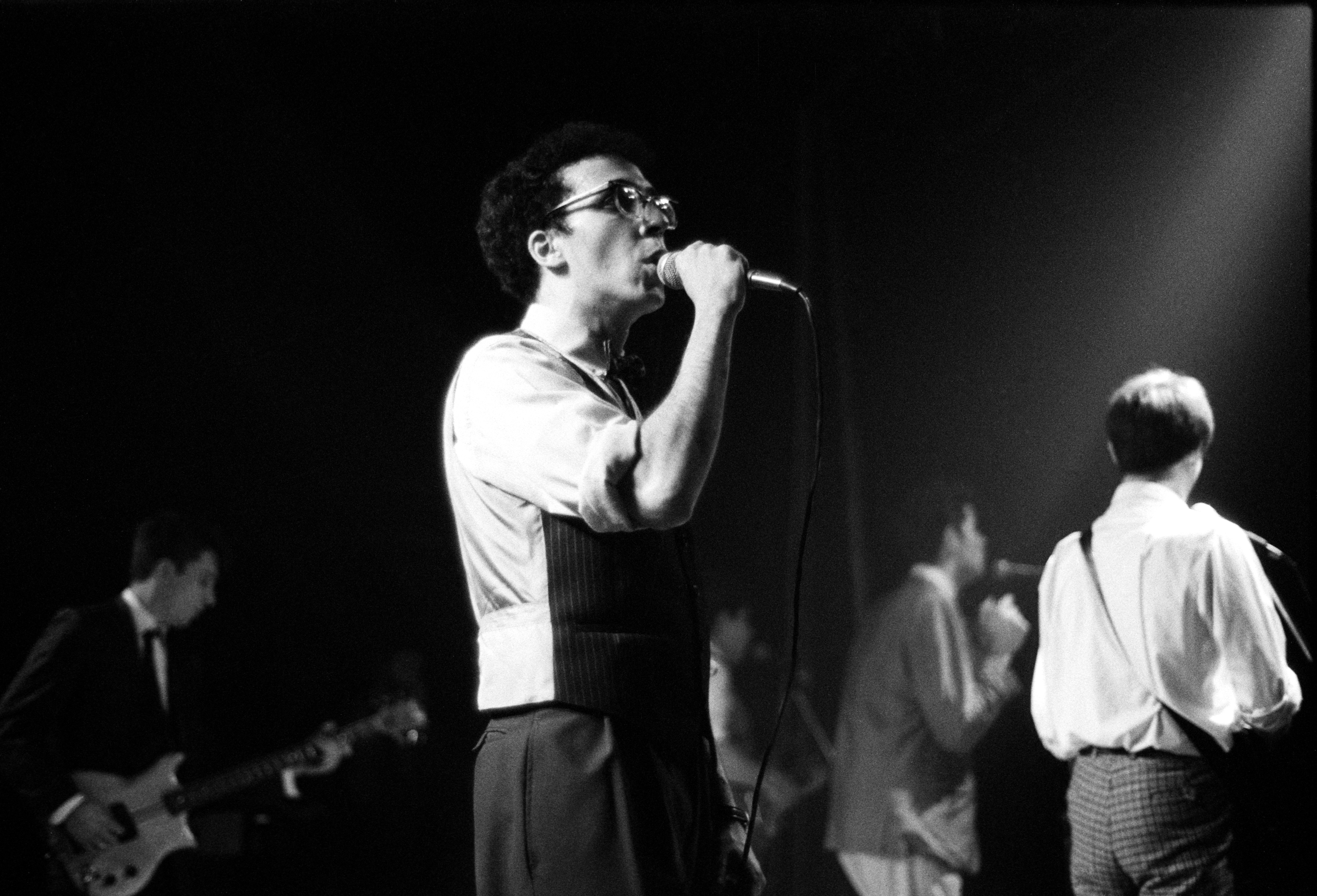“Love Has No Beginning”, says Ana Marija Grbić (1987) in her book “Idols and the Last Days” (Contrast Publishing), where she compiled her interviews with all the relevant actors of the love association, star-high rise and painful decline of one of the most important phenomena in the history of our music – VIS “Idols”. The story about “Idols” as well as many other things is also told by their gurus, on-and-off associates, companions… The book is given a special appeal by the story of Srđan Šaper, one of the key members of the band, and here are several excerpts from it.

photo -goranka matic
Before Idols
We used to hang out a lot during the grammar school period: Vlada Galić, Vlada Divljan, Milan Vlasinić, Predrag Smiljković, Nena, Nađa, Tijana Vujadinović, Nela, Marina Sinđić, and others from our class. We were a close-knit company, more or less good students in a school which was respected and which respected us too.
At different events that we organised, like get-togethers, birthday parties, or excursions, if anybody had a guitar, we would immediately play it and sing together. Vlada was a good guitar player and he could play different songs, from the band “Index” to “House of the Rising Sun”. He loved “Suzy Q” sung by Jose Feliciano and that version was a hit at all birthday parties; that was his top moment of the evening.
After the second grade, in the summer of 1974, Vlada Divljan, Vlada Galić, and I went together to London’s suburb Croydon for a month. There we learnt English and became really close. I remember that it was the time when David Bowie’s album “Diamond Dogs” came out. We were quite interested in it. In the end Vlada bought a cheap “Fender” guitar, so that music was ever-present there as well.
As time passed by, Vlada and I formed a kind of a singing duo. I always wrote poetry and I wasn’t bad at singing either. Vlada was becoming a better player and we particularly liked old Macedonian folk songs, Simon & Garfunkel, Korni Group, Time… Vlada Galić didn’t have a talent for music. The three of us began performing in the underground passages when we were only sixteen years old.

First gigs in London underground passages
We would sit down, put something for money in front of us, write that we had run out of money and couldn’t go back home. Our songs were mainly in Serbian and Macedonian and not in English because we found it more attractive. Vlada Galić would pass by and put some coins into the box in order to encourage others. We found it really interesting to make enough money for dinner by playing and singing for an hour or two – a pizza and Coca-Cola for each of us. It was definitely amusing.
I remember that I had taken 20 pounds to London (that proves that there is inflation all over the world, even there) and that I could live quite well with that money, plus I earned a little by playing music. OK, we used to live a different life at that time. The only cost we had was to pay a train ticket to London and back, to eat a pizza and drink a Coke. I remember that I could have it all for only 20 pounds. In addition, I bought a pair of jeans which cost six or seven pounds and a jacket for five pounds. And that’s it: a jacket, jeans, and one month in London cost me 20 pounds.


Then one day we realised that the underground passage in Croydon (a working class suburb) was definitely not an attractive enough place for us if we wanted to do “business”. We went to Piccadilly Circus tube station and found a good corner in the passage, on the way to the platforms. That’s where we started playing, but just a few minutes later there was a police officer asking us if we were members of the Union of Street Musicians. Of course, we said we weren’t.
Those first gigs paved the way for “Idols”. Later on, Vlada and I had a lot of similar anecdotes because we travelled a lot after third and fourth grade. I remember that after third grade we had Interrail monthly tickets and travelled all over Europe. If we couldn’t get somewhere by train, we hitchhiked. No visas were necessary for people with Yugoslav passports. We could exchange dinars in all foreign countries. We were sixteen but our parents allowed us to spend a month travelling around Europe because the world used to be a much safer place than today. We had a backpack and a guitar. The following year we changed our itinerary. In any case, we travelled a lot again and visited fifteen European countries. Once again we carried our guitar and played and sang something all the time.

Defence
We wrote some songs much earlier. For example, the song “Where are you now, Kitty cat” is the very first song played by “Idols”, but most of the songs were made for an occasion.
“Defence” is an unusual experiment with a ritual dimension which involved the whole story. We wanted that album to be something between heaven and earth, just like our lives. That’s why most of our songs were immersed in a form of spirituality, and some others seemed to be ordinary and simple. Many people said the album gave them a mental freedom and enabled them to think differently and search the limits of freedom at a time when music, even rock music, was rather utilitarian and reduced to several clichés.
We tried to open up many other topics and that was the essential idea of the new wave – a sort of freedom to be yourself. I loved writing songs but Vlada didn’t. He liked to write several verses and then just repeat them. That’s why we have a lot of songs which were made as a sort of patchwork; I wrote a few lines, Vlada wrote several others, and so did Krle. I wrote the lyrics for “Kenozoik” but the tune is composed by all of us. There are so many different associations there, including the blessed hand of Saint Sava and pubes lux. Those two ideas are there side by side.
About the verse “He’d like to be that girl”
The song “You’re Mine” was my lyrics while we all wrote the music. This song is sung in several voices. It is a combination of transgender growing up (bildung), transcendental and political. That’s a song about a hero, actually a hero archetype from the mythical Balkans, the way you see it at the age of 22. The verse “He’d like to be that girl” doesn’t mean that he would like to change his sex; I think it’s a bit more complex. He may be striving for Plato’s equality of the sexes. The verse “For the Moon the mandolins are dying” means a thousand years of poetry preceding our time; the verse “Mothers and fathers take turns” is our long-lasting duration, the heritage carried by everyone. As for the verse “His skin resembles hyacinth”, many people used to think that it referred to Tito. It is an ancient exchange of tragic and comic opinions. If someone wanted to decode this album, he might look at the song “You’re Mine” as the central one from which the topics of all other songs on the album derive.
For example, “Shadows are Different”: the song is about birth, the way it constantly happens in youth. Each and every year is a new discovery, a new opening to the world. The verse “Let this glass pass them over” refers to what Jesus Christ said on the eve of his crucifixion. If the song “You’re Mine” is a sort of an ancient chorus of this album, then it is natural that other songs derive from it symbolising birth, growing up, and old age.
Future in the song “Lads Were Dancing”
For example, my favourite song is “Mutely”. It speaks of growing up and the fear of the man who is becoming someone else. Essentially, that’s the fear you have in your youth, the fear that in the future you’ll get far away from the reason of your being here. So, it’s not only the fear of losing your identity but of losing hope. When I say growing up, I refer to the moment when you are twenty and pass from your adolescence into a completely different period of life and you’re losing what you think is only yours. You’re becoming somehow ordinary, just like anyone else. “Mutely” actually speaks of that “moulding”.
“Russia” is a classic example of what this album means, of numerous dedications in the lyrics. Krle lived in Bakić Street and I read a book by Alexander Fadeyev and used the story about Vostok. In his songs Vlada often had an image of a woman who was stronger than him, and that also appeared in his lyrics later on.
There is a whole series of different songs such as “Lads Were Dancing” and our first song “Where are you now, Kitty cat”. We used to have quite a solid fear: when we felt we went too far, we had to make a casual song like this. So the song “Where are you now, Kitty cat” is just like the Fool card in tarot. In “Lads Were Dancing” we saw the future: the connection between the dancing parties in local communities and the huge dance of lunacy which engulfed the whole country much later.
The topic in Vlada’s songs is always the simplicity of love versus the chaos in the world, while there are always departures in my songs – “Love me Gently While I’m Still Here”, like in “Defence”. Body love is a better answer than some light symbols.
Krle’s song “Main Bird” is also very interesting. He wrote both the lyrics and music for it. The song reminded me very much of “The Beatles” – McCartney, Lennon, Harrison. They had those creative author combinations in their songs.
The song “Come on, Dream about me” is a classic song of that kind. The lyrics and melody of the stanzas are mine, inspired by some Bryan Eno songs. The refrain was written by Vlada and everything fit that just perfectly.
Last days
The concert in Ljubljana was in April 1984. There was some kind of continuous tension among us. Maybe the song “Chocolate” placed us in a different position. We had to be predominantly performers and I think that it didn’t appeal to any of us. We always wanted to be authors of everything, including the stage performance.
Maybe we were just kids; we didn’t have a serious manager at all so no one could guide us. Everything was left to some internal forces which you can’t manage at that age. In the end Vlada went too far in his wish to be the frontman. He became anxious and some things that were happening were not OK. I was very much into films at the time because I was more interested in that area. On the other side, Krle went in his own direction too.
Argument in Ljubljana
At that concert in Ljubljana we had an argument and then decided that we couldn’t go on with Vlada. The idea was to form a band without him because the situation between all of us on one side and him on the other side was quite complicated. There was some internal restlessness. In any case, we didn’t have any more rehearsals and that was the natural end of the “Idols” thing.
Personally I think that the end was good for us because, in my opinion, we couldn’t keep the same quality and innovation. Some things changed and we were definitely different. We remained well-known for our last album and the best one – that’s how people see “Defence”. We remained a famous band after four years, maybe a little longer.
When we leave this planet, we will be remembered as something beautiful, like members of “Idols”. That will be the point defining our existence on the Earth.